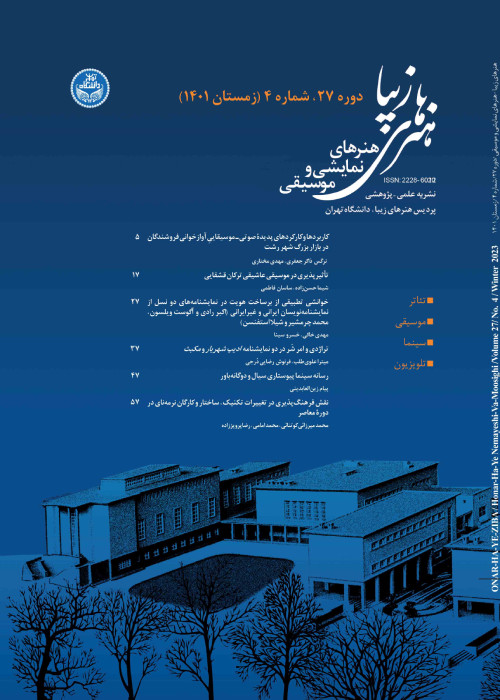Nakhl-bandi; an example of scenic design in Iranian culture
Author(s):
Article Type:
Research/Original Article (دارای رتبه معتبر)
Abstract:
Art is an inseparable part of life which manifests in all aspects of human life. One of the most significant manifestations of art is decoration of parlors, circles and venues for various kinds of ceremonies. In general, these decorations are occasionally performed for ritual and religious ceremonies, sometimes for festivals and entertainments, and sometimes for funerals or mourning rites. According to the resources studied in this paper, the above mentioned decorations have already been used and people employed them in various ceremonies and other aspects of life. EIn fact, every part of the decoration had specific title, and its construction was related to particular professions and different masters. According to the existing evidences used in this article, in some of these parlors and ceremonies you could see manifestations of the performing arts which could be counted as scenic design; needless to say that its performance could be influenced by various issues such as time, place and social class. In fact, this included construction for decoration and design of the venue. One type of decoration being used in the past was the art of Nakhl –bandī done by the Nakhl -bands. They are made of wax, paper, fabric, mud, wood and all kinds of flowers, fruits and artificial trees with different colors and designs in order to beautifully decorate a place. To describe the words Nakhl -band and Nakhl -bandī in the verses where these exact terms have been used, some editors of the Davāvīn (poets collected lyrics) have briefly demonstrated them in the book margins and footnotes which we will mention in the article. As for the terminology of this art, two groups have paid particular attention because these two words Nakhl -band and Nakhl -bandī (and other related terms) figured in verses and prose texts: the first group was lexicographers who explained the term because of its use in manuscripts, and the other, commentators and editors of poets who almost entirely gave a short and wrong description.We shall also remind that none of the studies conducted in Iran, focused on the scenic designs based on the history of performing art, music and other artistic performances have pointed to this issue as an example of stage design art. Although studies have been carried out independently on the issue of mourning and Nakhl -gardānī, as we see later, the issue of Nakhl-bandī and Nakhl –gardānī have been misinterpreted and have been considered as one. No independent research on the history of Nakhl -bandi has been conducted, especially in the field of scenic design in Iranian culture; in fact, Nakhl -bandī is considered as a forgotten art. Therefore, the main aim of this research is to clarify the dimensions of this old art and to answer literary, historical, and technical questions related to the profession of Nakhl-bandī and explain the differences between Nakhl-bandī and Nakhl –gardānī. This is a descriptive -analytical research and is based on the data extracted from the manuscripts and collected from libraries.
Keywords:
Language:
Persian
Published:
Honar-Ha-Ye-Ziba: Honar-Ha-Ye Mosighi Va Namayeshi, Volume:24 Issue: 64, 2020
Pages:
67 to 76
magiran.com/p2077721
دانلود و مطالعه متن این مقاله با یکی از روشهای زیر امکان پذیر است:
اشتراک شخصی
با عضویت و پرداخت آنلاین حق اشتراک یکساله به مبلغ 1,390,000ريال میتوانید 70 عنوان مطلب دانلود کنید!
اشتراک سازمانی
به کتابخانه دانشگاه یا محل کار خود پیشنهاد کنید تا اشتراک سازمانی این پایگاه را برای دسترسی نامحدود همه کاربران به متن مطالب تهیه نمایند!
توجه!
- حق عضویت دریافتی صرف حمایت از نشریات عضو و نگهداری، تکمیل و توسعه مگیران میشود.
- پرداخت حق اشتراک و دانلود مقالات اجازه بازنشر آن در سایر رسانههای چاپی و دیجیتال را به کاربر نمیدهد.
دسترسی سراسری کاربران دانشگاه پیام نور!
اعضای هیئت علمی و دانشجویان دانشگاه پیام نور در سراسر کشور، در صورت ثبت نام با ایمیل دانشگاهی، تا پایان فروردین ماه 1403 به مقالات سایت دسترسی خواهند داشت!
In order to view content subscription is required
Personal subscription
Subscribe magiran.com for 70 € euros via PayPal and download 70 articles during a year.
Organization subscription
Please contact us to subscribe your university or library for unlimited access!


